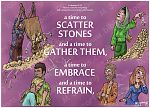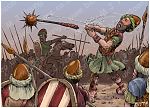Bible Cartoon: Ecclesiastes 03 - A time for everything - Scene 05 - Search, give up, keep, throw
Click on Add to cart button below shopping cart.
Purchased Bible Cartoons do not have watermarks. Links to Cartoons provided on email once purchase is completed.Bible Book: Ecclesiastes
Bible Book Code: 2100300601
Scene no: 5 of 7
Bible Reference & Cartoon Description
Ecclesiastes 3:1,6 (ANIV)
1 There is a time for everything, and a season for every activity under heaven:
6 a time to search and a time to give up, a time to keep and a time to throw away, …
DRAWING NOTES:
TIME OF DAY:
LIGHTING NOTES:
CHARACTERS PRESENT:
RESEARCH/ADDITIONAL NOTES:
I have decided to include verse 1 in all the following 7 “A time for everything” scenes & articles notes, to remind the viewer of the point of the list (verses 2-8).
The teacher (king Solomon) refers here (verse 1-8) to every activity under heaven, meaning everything that we human beings get up to. Our achievements, our follies, our actions, our lack of actions, our moods & attitudes. Of course this is not a comprehensive list of ALL human activity, but I think it is indicative of the major headings of human activity.
By looking at other versions of the Bible we can get a more complete understanding of what the teacher was writing about. Verse 1 in the Amplified Bible refers to “every matter or purpose under heaven”. In the Message version “a right time for everything on the earth” is referred to, whilst the Bible in Basic English calls it “every business under the sun”. The English Standard Version refers to it as “every matter under heaven”.
The Hebrew word for “activity,” (chephets (transliteration); pronounced khā‘·fets) always used of people, literally means “delight”, “desire”, “longing”, “the good pleasure” &/or “that in which one takes delight”. The word also refers to willing participation &/or acceptable purpose.
In relation to all of these various human activities the teachers states (in verse 17 of the same chapter):
17 I said to myself, “In due season God will judge everyone, both good and bad, for all their deeds.”
Notice it says ALL their deeds, not merely some of them. It refers to all deeds we willingly participate in.
The teacher followed his general statement (”There is a time for everything…”) with a poem composed of 7 pairs (14 in total) of polar opposites. It is interesting that king Solomon used 7 pairs of polar opposites (the poetical device called merism), since the number 7 suggests the idea of completeness or totality in Hebrew literature. Solomon begins his poem with “birth & death” and ends it with “war & peace”, with all the other human activities in between these grandest & gravest of themes.
Search, Give up, Keep, Throw.
Now to the particulars: verse 6 – “a time to search and a time to give up, a time to keep and a time to throw away, …” the polar opposites in this verse are searching & giving up (on a search), keeping (or holding on to something) & throwing away (or getting rid of something).
So far we’ve seen that King Solomon’s poem begins in reference to birth (the beginning of a person’s physical life) and death (the end of a person’s physical life), & in the next verse this concept of beginning & ending is further elaborated in reference to killing & healing. After that Solomon seems to turn his attention to writing about human reactions to the start & end of life, in referencing the polar opposites contained in his phases in ”a time to weep and a time to laugh, a time to mourn and a time to dance.”
In verse 5 Solomon is comparing scattering & gathering stones with embracing & refraining from that embrace. Again he uses polar opposites to make the point. The action of gathering stones is inclusive – collecting them, possibly in reference to the building mentioned in verse 4.
This brings us to the phases used at the beginning of verse 6 “a time to search and a time to give up, a time to keep and a time to throw away, …”
In other Bible versions we read “A time to get and a time to lose, a time to keep and a time to cast away,” (Amplified Bible), “A time to gain, And a time to lose; A time to keep, And a time to throw away;” (New King James Bible), the Message bible says “A right time to search and another to count your losses, A right time to hold on and another to let go,”. So the first pair of polar opposites are getting, gaining or searching versus losing, or counting your losses. The second pair are keeping or holding on versus casting or throwing away, or letting go.
In my picture you can see a man in the top left wearing red clothes, with his hand shielding his eyes from the bright sunshine. He is representative of “searching”, whereas the man in green (top right) who is shrugging his shoulders is representative of “giving up”, in this case, giving up on the search.
Solomon then wrote the two polar opposites “a time to keep and a time to throw away, …”. The first of the pair is represented in the bottom left of my picture by the woman in yellow who is holding a glass jar in her hands. The jar contains green liquid of some sort. The opposite is seen in the bottom right, with the woman in brown robes & pink head scarf, who is throwing a stone over her shoulder, indicative of “letting go”, or “throwing away”.
It is difficult to deduce exactly what King Solomon had in mind with these phrases. Some commentators think the searching & keeping in verse 6 might refer back to verses 2 & 4, & be about gathering materials for a building project of some kind. Perhaps Solomon kept his poem deliberately nebulous so that it can be applied to many of life’s situations.






